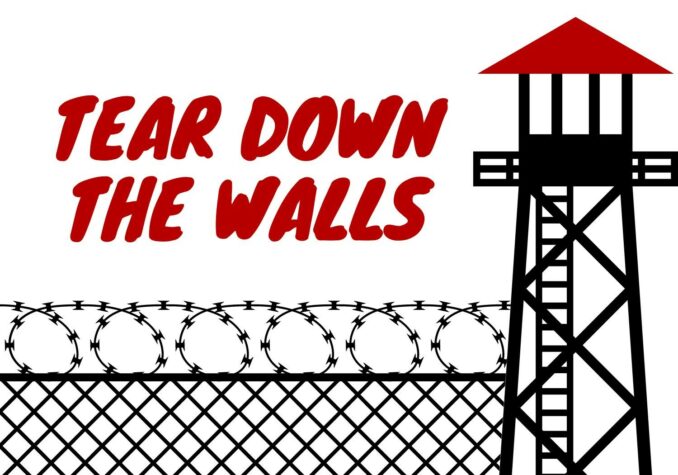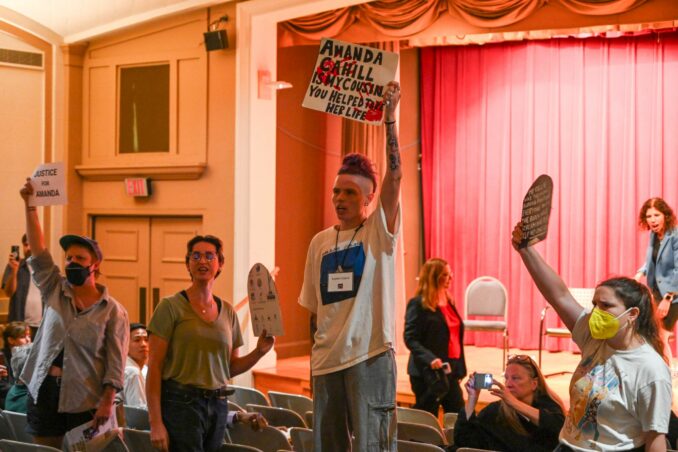Justice for Amanda Cahill!
 Philadelphia
Philadelphia
Protesting the recent deaths of Amanda Cahill and Michael McKinnis due to inhumane conditions inside Philadelphia jails and calling for an end to mass incarceration, dozens of activists disrupted and shut down a criminal legal system panel at the Parkway Central Free Library on Sept. 17.
As Philadelphia Department of Prisons Commissioner Michael Resnick was introduced at a panel discussion ironically entitled “Excessive Punishment and Mass Incarceration,” about half of the audience stood up in protest, including Cahill’s cousin, Kayden Hujack. As she and 40 other protesters held up signs, Hujack demanded justice for Cahill, 31, the mother of two young children, who died in a Philadelphia city jail cell on Sept. 7.

Amanda Cahill’s cousin, Kayden Hujack, leads chants charging Philadelphia Prison Commissioner Michael Resnick with murder, Sept. 17, 2024. WW PHOTO: Joe Piette
Cahill died while being held following a police sweep in the Kensington section of the city earlier this month targeting narcotics users and people with open warrants. Resnick, 61, was arrested at home on three outstanding warrants and was being held in the Curran-Fromhold jail. He was found deceased in his cell on Sept. 14. Both were being held in unsupervised intake units awaiting medical screening when they died.
Hujack yelled and her comrades repeated in call-and-response fashion: “Under your watch, my cousin Amanda Cahill died. For hours, women in their cells banged on their doors. They all called for help. Nobody came. How does that make you feel?”
As panel participants were escorted off the stage and quickly fled the room, the people’s mic repeated Hujack’s charged words: “Justice for Amanda Cahill. You took my cousin’s life. She suffered for six hours and 45 minutes. End the torture now. Justice for Amanda. Close the Philly jails now. Michael Resnick, you have blood on your hands.”
Jails are death traps
These most recent deaths in this city’s jails are not a new phenomenon. A November 2023 Workers World article reported: “Many community meetings and protests over the last three years outside City Hall and at the city’s four prisons criticized rodent infestations, small food portions, the use of solitary confinement, severe staffing shortages and other inhumane policies in Philadelphia jails.” (www.workers.org/2023/11/74858/)
An August 2022 PrisonLegalNews.org article reported: “Philadelphia’s jails appear to be failing on nearly every level, from staffing and security to medical and mental health care, occupational opportunities, library and recreation time and even the provision of the most basic human needs such as food and sanitation.”
There were recent warnings from community activists, health and policy experts, former Prison Commissioner Blanche Carney and Bruce Herdman, current chief of medical operations for the Philadelphia Department of Prisons, that the system was incapable of safely handling an influx of arrests and providing adequate medical care inside already chronically understaffed and overfilled facilities.
Instead of using harm reduction mobile units and other programs to save the lives of chronic drug users in Philadelphia’s Seventh District, city officials decided to order sweeps of people using drugs in impoverished Kensington neighborhoods, placing many of them in the already overwhelmed city jail system.
The Philadelphia Inquirer, Sept. 17, noted: “This summer a federal judge found the city in contempt of court for failing to remedy unconstitutional jail conditions and ordered the city to pay $25 million into a dedicated jail-operations fund to be overseen by the court.” The impact of documented violence, prolonged solitary confinement and inadequate health care in the jails endangers everyone, including the physical and mental health of those newly detained through the drug sweeps.
Putting more people in jail is not the way to solve or prevent community health issues in Kensington. Instead of enacting a public health approach to the long-time, ongoing crisis, Resnick, Mayor Cherelle Parker and other city bureaucrats are instituting policies that kill people.
The solution isn’t that hard to understand. If the city invested in more health care, libraries, after-school programs, job training and other community programs instead of mass incarceration, Amanda Cahill and Michael McKinnis would be alive today.

